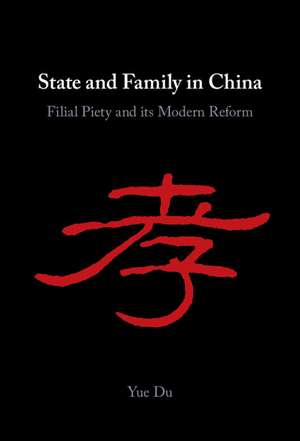State and Family in China
Autor Yue Duen Limba Engleză Hardback – 10 noi 2021
| Toate formatele și edițiile | Preț | Express |
|---|---|---|
| Paperback (1) | 177.67 lei 43-57 zile | |
| Cambridge University Press – 25 oct 2023 | 177.67 lei 43-57 zile | |
| Hardback (1) | 530.50 lei 22-36 zile | +25.51 lei 6-12 zile |
| Cambridge University Press – 10 noi 2021 | 530.50 lei 22-36 zile | +25.51 lei 6-12 zile |
Preț: 530.50 lei
Preț vechi: 576.63 lei
-8% Nou
Puncte Express: 796
Preț estimativ în valută:
101.51€ • 106.25$ • 84.49£
101.51€ • 106.25$ • 84.49£
Carte disponibilă
Livrare economică 10-24 martie
Livrare express 22-28 februarie pentru 35.50 lei
Preluare comenzi: 021 569.72.76
Specificații
ISBN-13: 9781108838351
ISBN-10: 1108838359
Pagini: 350
Dimensiuni: 158 x 235 x 20 mm
Greutate: 0.59 kg
Editura: Cambridge University Press
Colecția Cambridge University Press
Locul publicării:Cambridge, United Kingdom
ISBN-10: 1108838359
Pagini: 350
Dimensiuni: 158 x 235 x 20 mm
Greutate: 0.59 kg
Editura: Cambridge University Press
Colecția Cambridge University Press
Locul publicării:Cambridge, United Kingdom
Cuprins
Introduction: filial piety beyond confucianism; Part I. Ruling the Empire through the Principle of Filialit: 1. 'Parents can never be wrong:' punishing rebellious children as a didactic show; 2. Policies and counterstrategies: negotiating state-sponsored filiality in the everyday; 3. 'Parenting all under heaven on behalf of heaven:' state-sponsored filiality and imperial rulership; Part II. Building the Nation through Restructuring the Family: 4. Reorienting parent-child relations: from parents' authority to children's rights; 5. Reconceptualizing parent-child relations: from life-long parental privilege to transitory guardianship; 6. A constitutional agenda: remaking the family to make a new state; Conclusion: filial piety toward the state.
Recenzii
'Through nuanced analysis of extensive archives and legal practices, this stimulating book sheds completely new light on the ideological and juridical centrality of the family and filial piety to the state and society of late imperial and modern China. It is a highly valuable contribution to multiple fields including Chinese studies and comparative law and history.' Li Chen, University of Toronto
'The legal cases in State and Family in China frame an elegant and innovative history of the transfigurations of filial piety in the state's interventions into hierarchical family dynamics from the Qing through the Republican period. As Yue Du shows, even as the Nationalists gave new rights to adult children curtailing the absolute authority of biological parents, they established Sun Yat-sen as the omnipresent Father of China's modern citizenry.' Maram Epstein, University of Oregon
'Offering a dynamic and sweeping portrait of China's filial tradition from the Qing Dynasty to the present day, Yue Du proves that the multifaceted ways in which successive Chinese regimes cultivated, deployed (or denounced) filial obligation remain essential not only to understand Chinese society in the past, but also the PRC's vision of its future. Calling upon vivid legal records, this book demonstrates how filiality may well be the most significant relationship for interpreting Chinese law, family, and governance. In this book we find a startling and sobering analysis of the exploitation and manipulation of family hierarchies by parents, evolving legal systems, and an invasive state.' Johanna Ransmeier, University of Chicago
'The legal cases in State and Family in China frame an elegant and innovative history of the transfigurations of filial piety in the state's interventions into hierarchical family dynamics from the Qing through the Republican period. As Yue Du shows, even as the Nationalists gave new rights to adult children curtailing the absolute authority of biological parents, they established Sun Yat-sen as the omnipresent Father of China's modern citizenry.' Maram Epstein, University of Oregon
'Offering a dynamic and sweeping portrait of China's filial tradition from the Qing Dynasty to the present day, Yue Du proves that the multifaceted ways in which successive Chinese regimes cultivated, deployed (or denounced) filial obligation remain essential not only to understand Chinese society in the past, but also the PRC's vision of its future. Calling upon vivid legal records, this book demonstrates how filiality may well be the most significant relationship for interpreting Chinese law, family, and governance. In this book we find a startling and sobering analysis of the exploitation and manipulation of family hierarchies by parents, evolving legal systems, and an invasive state.' Johanna Ransmeier, University of Chicago
Notă biografică
Descriere
Examines the intersection of politics and intergenerational family relations in China from the Qing period to 1949.
